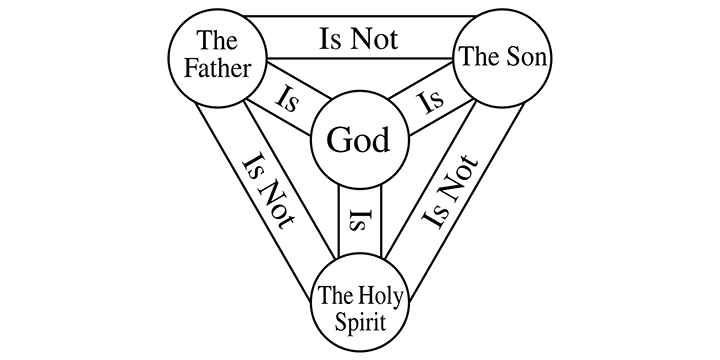This may be a surprise to many people but there is scholarly consensus among Christians, Trinitarian Christians, that Jesus and his apostles did not think of God as a trinity. How do we know? Because:
- The first person in the history of the Christian church to think of the Logos of John 1:1 as a person was Justin Martyr in the year 150 AD. Before that Christians believed the Logos was a thought in God's mind. See definition #2 in your Bible dictionary.
- The first person to put the number 3 and God together in the same sentence was Tertullian in the year 200 AD. Prior to that God was only considered to be one person.
- It wasn't until the 2nd half of the 4th century that anyone proposed: "that God the Father, Jesus the Son and the Holy Spirit were coequal and together in one being, yet also distinct from one another."
If you don't believe these points as they developed in the church, you can hardly be considered a Trinitarian.
Here's some of that scholarly consensus. Trinitarian scholars for the most part agree with most of the following quotes:
“Theologians today are in agreement that the Hebrew Bible does not contain a doctrine of the Trinity. In the immediate post New Testament period of the Apostolic Fathers no attempt was made to work out the God-Christ (Father-Son) relationship in ontological terms.” - Encyclopedia of Religion
“The formulation ‘one God in three Persons’ was not solidly established, certainly not fully assimilated into Christian life and its profession of faith, prior to the end of the 4th century. But it is precisely this formulation that has first claim to the title THE TRINITARIAN DOGMA. Among the Apostolic Fathers, there had been nothing even remotely approaching such a mentality or perspective.” - The New Catholic Encyclopedia
“a process of theological exploration which lasted at least three hundred years . . . In fact it was a process of trial and error (almost of hit and miss), in which the error was by no means all confined to the unorthodox . . . It would be foolish to represent the doctrine of the Holy Trinity as having been achieved by any other way." - Anthony and Richard Hanson - Reasonable Belief: A Survey of the Christian Faith (1980, p. 172)
“This was a long, confused, process whereby different schools of thought in the Church worked out for themselves, and then tried to impose on others, their answer to the question, ‘How divine is Jesus Christ?’ . . . If ever there was a controversy decided by the method of trial and error, it was this one” (ibid, p. 175).
The church prior to the development of the Doctrine of the Trinity was not Trinitarian. The writers of the New Testament were not Trinitarian. Jesus and his apostles were not Trinitarian. They did not believe or teach the points at the beginning of this post. God being three in any, way, shape or form was not a part of their vocabulary. Though their Greek language vocabulary included words that meant "triune" that language was not used in reference to God until about 200 AD.
If they were not Trinitarian, then what were they?
They were Unitarian!
What's that, you ask?
I will try to answer that question in further posts, if you are interested. Let me know if you are interested.
Even if you never end up agreeing with Unitarian doctrine I hope that by the end of this you will have what you need to justify a reason to eliminate belief in this creed as a requirement for membership or ordination in your church or organization. If we can agree that genuine Christians have legitimate reasons to reject the Doctrine of the Trinity and we should not allow division based on where people stand on this issue then this will be a rewarding endeavor.
In order to untangle the string of assumptions that led to the Doctrine of the Trinity in the 4th Century we need to take a closer look at the assumptions in this popular diagram which is often used to "explain" the godhead:

We need to look closely at the following:
The Son is God
and:
The Holy Spirit is God
Is this fact or assumption?
The Bible clearly teaches that "Jesus is God", right?
That's the assumption we need to examine.
Stay tuned.
That said, I am in no way interested to quarrel or to go into lengthy discussions. I am not a pastor, I am not an expert in Hebrew, Greek or Aramaic languages. I am but a simple child of God, aiming to share what I was taught and what I believe to be true.
2 Timothy 2:24-25
24 And a servant of the Lord must not quarrel but be gentle to all, able to teach, patient, 25 in humility correcting those who are in opposition,Dear @kirbyhopper, please drop the link to your next post in a comment of one of my posts. The only thing that can convince me of any doctrine is the word of God. So if you have scripture to convince me of that I will gladly look at it. The purpose of my study is not to proof you wrong. I skipped that part because I thought it not to be necessary. But now that you brought it up, I decided for the sake of the other students I should go back and do it.